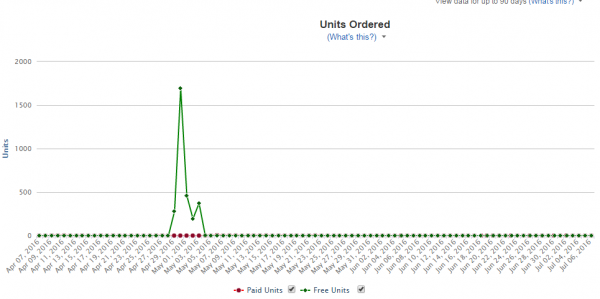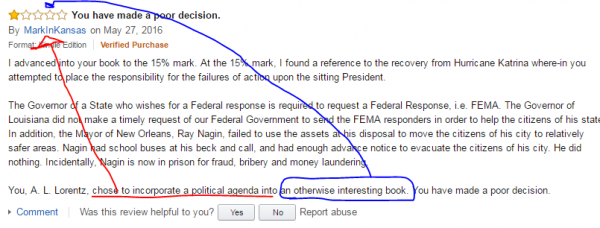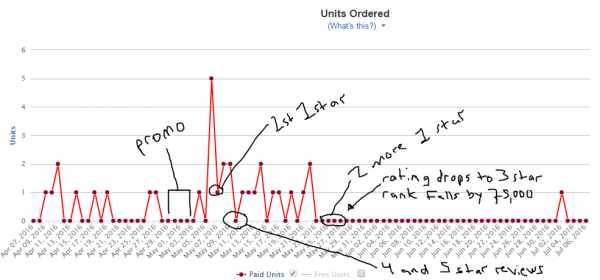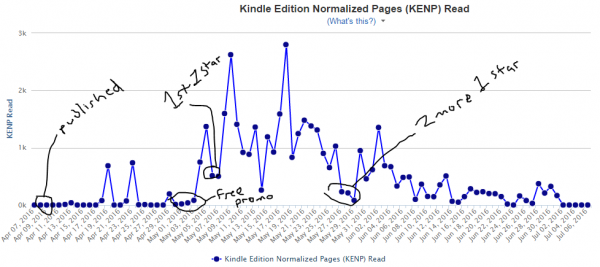On April 8th I self-published my second novel: The Filter Trap. I purposefully didn’t promote the book (or even mention it was up for sale to friends) for nearly a month so I could establish a control period to gauge the effectiveness of later promotions.
When the Kindle promotion (free downloads) launched I advertised it in several places. It was also shared by many friends on facebook (if that was one of you – thank you!). Unfortunately, I have no way to determine where the free downloads came from. Amazon keeps that info to themselves since they want authors to spend money on their proprietary advertising (which you wouldn’t do ever again if you knew 90% of your downloads came from facebook shares or Freebooksy or Goodreads).
The book skyrocketed to the top of the free sci-fi books list, hitting the top three by the third day of the promotion and top 100 of all free books (some authors plaster “Amazon Best Seller” on their cover when that happens, but I feel that’s a bit disingenuous). By the time the five days were over the book had been downloaded for free 3,000 times. It felt good to see that, but unlike movie sales, album releases, and many other forms of art the feedback is anything but immediate for novels.

But anyway, 3,000 downloads. Woohoo, right?! A week later we left for vacation and I hoped sales would keep humming in the background. When we had working wifi and I checked in on the book I received less encouraging news.
From those 3,000 downloads only a few reviews trickled in (assuming all the reviews so far are from downloads it’s had a 0.3% response rate), and not all of them good. Three (of only nine to date) were the dreaded one-star review, which is worse than no reviews at all in Amazon’s (and potential readers’) eyes. From the other side of the planet, I watched my sales rank plummet.
Much has been written at greater length by more experienced writers about how authors should deal with one-star reviews, especially capricious ones that don’t seem to contain any actual criticism. The most important advice is always: Do not respond! It was incredibly difficult to do that.
Here are my thoughts on the three reviews, all of which I did not see until I was in Europe (Amazon doesn’t notify authors when new reviews go up, you just have to check your own book page from time to time).

For the curious, here is the exact passage (pertinent dialog highlighted by me, not in the actual text) that Mark in Kansas was so upset about that he slammed down the book at only 15% in and gave it a one-star review:
“The water at Crissy Field must be up to people’s ankles,” Allan mentioned to the others in the Hummer as they plowed through the swamp lapping at Marine Drive.
“I seen this before,” the driver said. “I got sent in after Katrina. People were dragging bodies out of flooded homes in knee-high water in the 9th Ward the day after the storm.”
“That president failed to act quickly and decisively. I think this president will do better,” Allan claimed.
“You think!” The other soldier turned his head. “This is Katrina times a thousand, all along both coasts.”
They climbed up the hill in silence from Marine Drive.
“Then again, you on his little list, so you’d know,” the driver sarcastically stated.
Passing over the Presidio by taking the 101, he lamented, “Hope he’s right. We almost there.”
What Mark in Kansas isn’t telling you in his nonsensical review is that he’s reacting to a character’s opinion, not an author stating a fact. Earlier in the story, Allan was set up as an obvious “liberal.” He’s a college professor and scientist who strives for recognition and fame and doesn’t particularly trust conservatives or the military. This was a purposeful machination to build conflict as several times his life is saved by the heroics of the US military. His statement about the president is something a devout liberal would say about Katrina, and it’s only meant to build up to a later reveal and realization that the state of the world cannot be helped no matter who is in the white house. If Mark in Kansas had stuck with the book a little longer he would have seen that.
Instead – kaboom! Let’s make sure nobody else reads or buys this (clearly!) liberal author’s book that took years of work and thousands of dollars to create! Mission Accomplished, Mark! Should I come to your workplace and try to get you fired because you think George Bush is a hero? I bet your boss understands your personal political opinions are not expressed in your work and wouldn’t care. Why don’t you give me that same leverage to tell a story containing characters you may not agree with 100% of the time? Or is the modern conservative bubble so tight that not even fiction containing liberals is allowed to exist within? That’s starting to sound less like political ideology and more like religion.
Golly, I wonder if Proud Mark is aware that Dick Cheney diverted electricity away from hospitals without power to make sure gas pipelines from Texas didn’t go down. Or that FEMA director Michael Brown insisted the decision to federalize the Louisiana response was entirely political (Louisiana had a democratic governor at the time). As for the assumption that my character (not me) was wrong in saying Bush did not “act quickly and decisively,” consider that in the immediate aftermath the Bush administration refused aid offered by many countries. Furthermore, the U.S. House of Representatives (despite having a Republican majority at the time) issued a bipartisan report identifying “failures at all levels of government.” That would include the President, wouldn’t it?
But let’s torpedo this book for even having a character suggesting the President had any blame for the plight of the 9th ward. A sensible reader response to a science fiction self-published FREE book, right?

The reaction from Sailor Bear (from Texas, obviously) is even more befuddling. He finished the book, making it to the “controversial” ending – but completely misinterpreted it. Spoiler alert: The ending of the book contains a note from the author urging readers to make up their own mind about what the president should or shouldn’t do and then stop reading… or continue to read the original ending. It’s made quite clear that the president is wrestling with multiple interests involved in a world-altering decision. As in real life, there is no solution that will please everyone. I won’t get into why Sailor Bear might think the decision made is “betraying us all,” (a matter of opinion) because the important part is that he believes this is “acting like our current president.” Essentially if I’d written a book about Hitler in a negative light Sailor Bear would have given that book a one-star review as well because it reminded him of Obama. Whether you approve of Obama or not, it’s ridiculous to believe he’s “betraying us all.” That sounds like the same kind of willful ignorance (usually a smokescreen for racism) that birthers employ. (disclaimer: I actually never gave the president a name in the book, nor do I state the year the events happen, so any assumptions it’s President Obama are coming from the reader, not from the text)
The craziest part about Sailor Bear’s review is that he clearly hates Obama, yet is angry I made (a character who he thinks is) Obama act the way he thinks Obama really acts. If I had the president decide in a way incongruent with Sailor Bear’s warped view of Obama would he have still given me a one-star review because I was making his black Hitler into a hero?
I guess the lesson here is that it’s a lose-lose scenario for an author to ever put anything remotely political into a book.

The third one-star review (from an older white man in Utah… see a pattern developing?), although more cogent (albeit lazy) than the southern boys’, still leaves little crumbs for an author to learn anything by. At several points in the book the characters have to work together to solve problems and “save the day,” making me wonder if he was even reviewing the right book. As for being “emotional pygmies,” I guess I’ll take that as a hint I need to work harder on character motivation and dialogue?
So enough of my whining, let’s pull back the curtain and see how these brave keyboard vigilantes fared fighting for God and Country against struggling authors. Very well! After Kansas joined the party the book’s overall ranking fell to three stars, and sales dropped to zero for over a month. Even free reads through Kindle Unlimited fell away to almost nothing (after those already reading must have finished up). The overall amazon sales rank for the book dropped by over 75,000 and is still sinking.


You can see my sales in the chart above and do the math yourself. I have nothing to hide here, I haven’t even earned back the money spent on the promotional emails. Thanks to the heroic work of a few conservative readers I probably never will.
One-star reviews aren’t the problem, but the lack of positive reviews from folks who liked the book. In the more serious reader community of goodreads, the book has received more reviews and none were below three stars. Yet, since Goodreads averages reviews across multiple platforms, Mark in Kansas, Sailor Bear, and Mr. Utah 1965 have a long reach and are still managing to keep the book just below four stars.
(UPDATE: 48 hours after publishing this post one more Amazon review went up and two on Goodreads. The amazon review was three stars and the goodreads were… both two stars. So, my original preceding paragraph feels foolhardy and my original next paragraph feels heavier in retrospect. Although I still don’t agree with the one-star reviews, perhaps an average of three is appropriate? This is not providing a lot of motivation to finish the other pieces I’m working on.)
This leads me to believe that although the book may have flaws (perhaps serious flaws) it is impossible to tell how I’m writing via Amazon’s wild west rating system.
The point of this self-indulgent, long-winded post is that the most important thing to self-published authors is getting positive reviews from readers who actually liked the book. Everybody loves to talk about how much they hate something, but nobody wants to share how much they liked something. Especially if they didn’t absolutely love it.
But those reviews make or break sales rankings. Sales ranking determines who will “take a chance” on your book (if only other $2.99 purchases were so discriminating, I’ve never looked up online reviews while picking out a drink from the 7-11 refrigerator).
If you’ve read anything I’ve done, please leave a review. It doesn’t have to be nice. In fact, critical reviews are the most helpful and the only way an author can improve on blind spots. On behalf of all unknown authors artists, tell us what you think! Honest criticism of the work is infinitely more valuable to the creator than dishonest praise or condemnation.
For those of you who HAVE left an honest review, I noticed you and I’m forever grateful! I suppose the fact that I wrote a big long blog post about the bad reviews and not yours proves the point that we all tend to focus on the negative. Does that make me a hypocrite?

